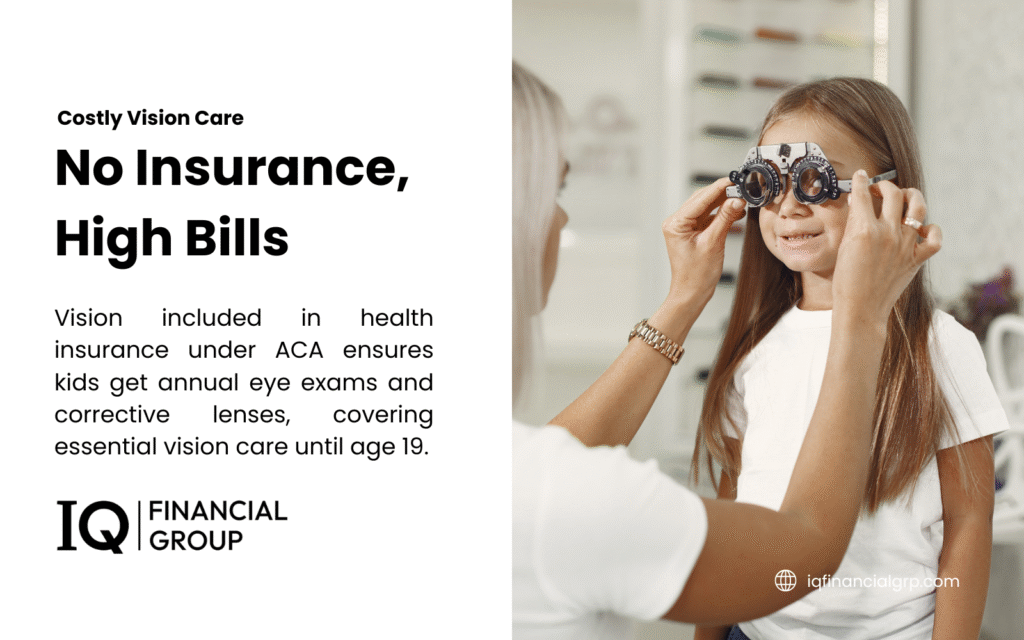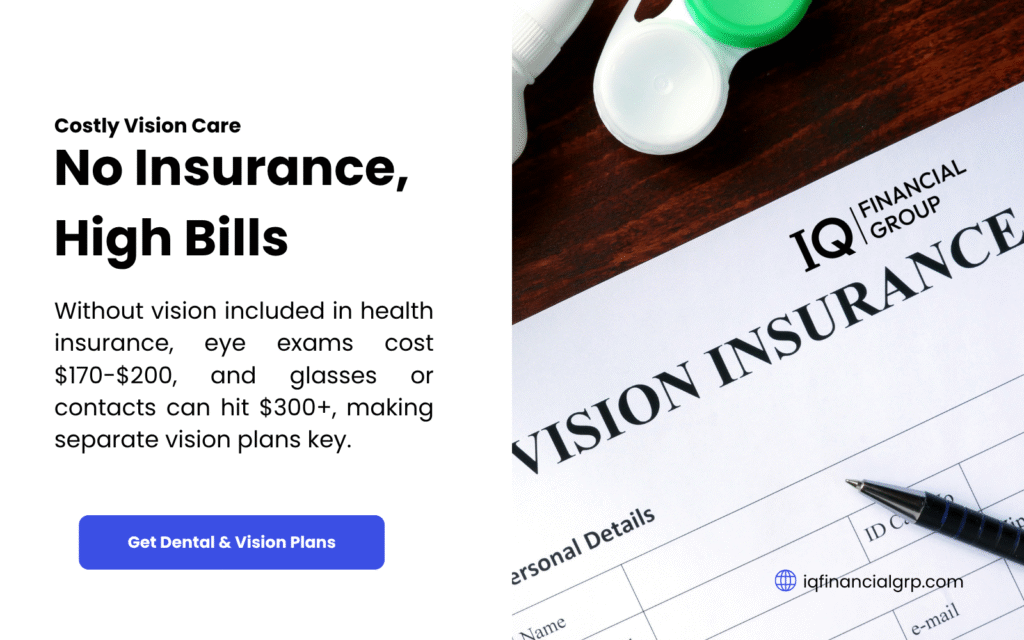Insurance paperwork can be confusing for many. Take the example of Jack who thought his insurance covered an eye exam, only to get slapped with a $180 bill because his health insurance didn’t cover routine vision care.
So the burning question on many people’s minds: is vision included in health insurance?
Most of us are pretty shocked to discover that our health insurance plans don’t automatically cover all those eye-related expenses we thought they would. Considering that about 3 out of 4 adults in the US need some kind of vision correction, knowing exactly what your health insurance covers for eye care is helpful.
So, Is Vision Included in Health Insurance?
Well, it’s complicated because coverage for eye care typically falls into several buckets:
What Standard Health Insurance Usually Covers
Most standard health insurance plans cover:
- Medical eye care: If you’ve got something seriously wrong, your regular health insurance typically steps up. These medical conditions, infections, or injuries usually get coverage.
- Eye emergencies: Sudden vision loss, chemical exposures, or that splinter that somehow finds its way into your eyeball – these urgent situations usually fall under regular health insurance.
- Basic screenings: Some plans include a quick “can you read this chart” kind of screening during your yearly physical, but don’t confuse this with a proper eye exam.
What Standard Health Insurance Typically Doesn’t Cover
Here’s where people get caught off guard:
- Regular eye check-ups: Your annual “how’s your vision doing” appointments with the eye doctor – you know, the ones with the “better 1 or better 2” questions – these usually aren’t covered.
- Glasses or contacts: Need new specs or fresh contacts? Your standard health plan usually says, “That’s on you”
- LASIK and friends: Elective procedures to fix your vision? Most insurance companies do not cover these.
- Specialized vision tests: Unless your doctor says they’re medically necessary, specialized vision tests often come straight out of your pocket.
Types of Vision Coverage Within Health Insurance
When digging into whether vision is included in health insurance, you’ll run into a few different setups.
Bundled Vision Benefits
Some health insurance plans (usually the more expensive ones) throw in some vision perks. These bundled benefits might include:
- One eye exam a year
- Some money toward frames and lenses
- A few discounts on other vision stuff
These bundled plans cost more upfront, and the vision benefits are often pretty bare-bones.
Vision Riders or Add-Ons
You can tack on vision coverage to your existing health insurance for a few extra bucks each month. Usually ,these include:
- Coverage for annual eye exams
- A decent allowance toward glasses
- Some money for contacts instead, if that’s your thing
- Discounts on stuff like LASIK
These riders often limit you to specific providers, so check if your favorite eye doctor is in-network before signing up.
Stand-Alone Vision Insurance
These are separate vision-only insurance plans that have nothing to do with your health insurance. These typically offer:
- Regular eye exams (usually one per year)
- Better allowances for glasses and contacts than the rider options
- More frequent coverage for new frames
- Better coverage for fancy lens options
The downside is that this is another insurance card to keep track of, another company to deal with, and sometimes coordinating benefits can be a headache.
Medicare and Vision Coverage
For seniors wondering if vision is included in health insurance through Medicare, the answer gets a bit tricky.
Original Medicare (Parts A and B)
Basic Medicare:
- Doesn’t cover yearly eye check-ups
- Won’t pay a penny toward glasses
- Only covers eye exams for specific conditions
- Will cover cataract surgery if you need it someday (and the basic glasses afterward)
Medicare Advantage (Part C)
Many of these plans include:
- Some basic vision benefits
- Different coverage levels depending on which plan you pick
- Some money toward glasses or contacts (though rarely enough for the progressive lenses)
- Generally better vision coverage than Original Medicare

Vision Coverage Comparison Table
Here’s a vision coverage comparison chart:
| Plan Type | Routine Eye Exams | Eyeglasses/Contacts | Medical Eye Care | Vision Surgery |
| Standard Health Insurance | Limited/None | Usually Not Covered | Covered | Covered if Medically Necessary |
| Vision Rider/Add-On | Covered | Partial Coverage | Limited Coverage | Some Discounts |
| Stand-alone Vision Insurance | Covered | Better Coverage | Limited Coverage | Better Discounts |
| Medicare Part A & B | Nope! | Nope! | Yes | Only if Medically Necessary |
| Medicare Advantage | Usually Yes | Often Some Help | Yes | If Medically Necessary |
| Medicaid | Depends on Your State | Depends on Your State | Yes | If Medically Necessary |
| Employer-Sponsored | Usually Yes | Usually Some Help | Usually Yes | Plan-Dependent |
Vision Benefits Through Employer-Sponsored Health Insurance
When trying to figure out if vision is included in health insurance through work, we’ve had wildly different experiences:
Personal Experiences with Employer Vision Benefits
A person who was working for a tiny startup got:
- A basic “can you see the exit sign” screening during the wellness exam.
- No actual vision insurance offered
- A little discount program
- An FSA that they could use for vision expenses
My second job (mid-size company) stepped it up:
- Vision insurance was offered separately at a group rate
- My eye doctor was in-network
- $150 allowance for glasses every 2 years
- HSA option
The third company:
- Basic vision screenings are included in our health plan
- Separate vision insurance with great rates ($6/month for better coverage)
- The choice between two vision plans depending on your needs
- Both FSA and HSA options are available
Company size often (but not always) correlates with better vision benefits. Always ask detailed questions during the interview process if vision coverage matters to you.
If you’re comparing employer health plans, you should evaluate vision benefits alongside other important coverage details, just like you’d want to know what does health insurance cover in terms of other essential services.
Children’s Vision Coverage Under Health Insurance
The Affordable Care Act (ACA) has specific provisions for children’s vision care, making the answer to “is vision included in health insurance” different for pediatric services:
- Pediatric vision care is considered an Essential Health Benefit
- All ACA-compliant plans must cover:
- Annual eye exams for children
- Corrective lenses (glasses or contacts) for children
- Treatment for vision conditions
- Coverage typically extends until age 19
Parents considering orthodontic work for children should also investigate if does health insurance cover braces in their plan alongside vision benefits.
Vision Insurance Networks
Understanding provider networks is crucial:
In-Network vs. Out-of-Network
- In-network providers have negotiated rates with your insurance
- Out-of-network care typically costs more
- Some plans have no out-of-network benefits
- Provider networks for vision care may differ from your medical network
Reading Your Insurance Policy for Vision Benefits
To definitively answer if vision is included in health insurance for your specific situation, carefully review:
- Summary of Benefits and Coverage (SBC): Look for a “Vision Services” section
- Evidence of Coverage (EOC): Search for detailed vision benefit explanations
- Vision Insurance Riders: Review any supplemental vision coverage documents
- Exclusions and Limitations: Check what vision services are specifically excluded
When to Consider Separate Vision Insurance
If you’ve determined that vision is included in a health insurance plan at a minimal level, separate vision insurance might be beneficial if you:
- Wear glasses or contacts
- Need specialty lenses (progressive, high-index, etc.)
- Have a family history of eye conditions
- Use digital devices extensively
- Are over 40 (when vision changes often accelerate)
When weighing this decision, consider how frequently you’ll need vision services, just as you might consider how often you’ll need to know if health insurance covers eye exams in your particular situation.
Vision Insurance vs. Health Insurance: Key Differences
There are some fundamental differences:
Health Insurance Focus
- Treatment of illness and injury
- Prevention of disease
- Management of chronic conditions
- Catastrophic coverage
Vision Insurance Focus
- Preventive and routine eye care
- Vision correction devices
- Discounts on services and products
- Limited coverage amounts
The Cost of Vision Care Without Insurance
If you do not have insurance, be prepared for these potential out-of-pocket costs:
- Comprehensive eye exams: $170-$200
- Single-vision lenses: $80-$120
- Frames: $100-$300+
- Contact lenses: $150-$1,500 annually
- LASIK surgery: $2,000-$3,000 per eye

Special Considerations for Vision Coverage
When evaluating whether vision is included in health insurance, several special situations warrant attention:
Pre-existing Eye Conditions
Unlike some health insurance restrictions, vision insurance typically covers pre-existing conditions, though waiting periods may apply for specific benefits.
Vision Coverage for Seniors
As we age, vision care becomes increasingly important. Medicare’s limited vision coverage makes supplemental insurance particularly valuable for seniors.
Vision Benefits for Specific Occupations
Some professions with high visual demands (like computer programmers or professional drivers) may have access to enhanced vision benefits through professional associations or unions.
Coordination Between Medical and Vision Insurance
When you have both types of coverage, understanding how they work together becomes important for maximizing benefits and minimizing costs.
Get Expert Guidance on Your Insurance Options
IQ Financial Group can help you understand all insurance packages and help you pick the best one. Our insurance specialists can walk you through your current vision coverage (or lack thereof), spot the holes in your protection, and find solutions that won’t require taking out a second mortgage just to see clearly.Schedule a meeting and make sure you’ve got a clear vision for both your eyes and your financial future.

